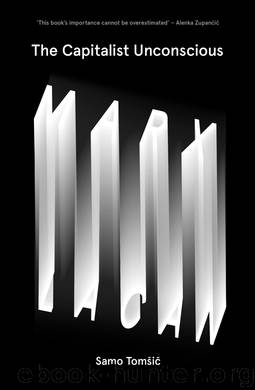The Capitalist Unconscious by Samo Tomsic

Author:Samo Tomsic
Language: eng
Format: epub
Publisher: Verso Books
Saving turns into spending and the unconscious appears as an ideal consumer. The problem is that metonymic movement creates long detours and actualises a tendency to spend. The combination of both operations, condensation and displacement, saving and spending, thus produces an apparent contradiction, an economic absurdity. Freud’s analysis shows that jokes generate a loss in order to reach pleasure-profit. The surplus is produced at the background of the interdependency between spending and saving, and the housewife metaphor is pertinent only in so far as it shows that saving should not be regarded as the ultimate goal of the process but as something that can as well be considered a form of spending, a production of surplus that differs from what would be the accumulation of savings. The appearance of saving masks that there is a different kind of production in the background. Similarly, the imperative of economic cuts and restrictions is the inevitable flip side of the imperative to produce surplus. The housewife example shows that the profit should not be attributed to the housewife but to the entire procedure. Economy can make profit because she is losing money in a seemingly rational economisation.
This structural operation is deployed in the social dimension of jokes. Jokes ‘should not, after all, be described as pointless or aimless, since [they have] the unmistakable aim of evoking pleasure in [their] hearers’. They cause pleasure, and this feature entails a shift from usefulness to uselessness. At this point, things complicate for the same reason as in dreams. The pleasure in jokes is reached through detour and at the background of the preceding renunciation of pleasure: ‘If we do not require our mental apparatus at the moment for supplying one of our indispensable satisfactions, we allow it itself to work in the direction of pleasure and we seek to derive pleasure from its own activity.’61 When the mental apparatus does not satisfy needs, it produces pleasure, but it is impossible to determine when one activity ceases and the other begins. Production needs to be associated with a problematic tendency, which opens up three possibilities: either the tendency is innocent (which is questionable in itself; why would it then be masked?), or jokes serve either a hostile or an obscene tendency (aggression or exposure). The procedure is marked by a libidinal investment that points back to the drive, this new object of study in connection to unconscious formations and, one could say, a new metaphor of the capitalist, the unconscious investor that has now replaced desire. Desire did not know what it wanted and has metonymically shifted from one object to another; the drive, however, ‘knows’ what it wants. It is fixated on the object.
As an example in which the hostile and the obscene tendency are combined, Freud mentions smut, where the psychoanalytic gaze meets unconscious production and its object at its purest. This is also where the third person that supports the mechanism of jokes and reveals the importance of the social link in the production of jouissance finally enters the picture.
Download
This site does not store any files on its server. We only index and link to content provided by other sites. Please contact the content providers to delete copyright contents if any and email us, we'll remove relevant links or contents immediately.
| Anarchism | Communism & Socialism |
| Conservatism & Liberalism | Democracy |
| Fascism | Libertarianism |
| Nationalism | Radicalism |
| Utopian |
The Secret History by Donna Tartt(16606)
The Social Justice Warrior Handbook by Lisa De Pasquale(11485)
Thirteen Reasons Why by Jay Asher(7779)
This Is How You Lose Her by Junot Diaz(5753)
Weapons of Math Destruction by Cathy O'Neil(5027)
Zero to One by Peter Thiel(4816)
The Myth of the Strong Leader by Archie Brown(4785)
Promise Me, Dad by Joe Biden(4439)
Stone's Rules by Roger Stone(4410)
Beartown by Fredrik Backman(4399)
How Democracies Die by Steven Levitsky & Daniel Ziblatt(4392)
The Fire Next Time by James Baldwin(4336)
100 Deadly Skills by Clint Emerson(4070)
A Higher Loyalty: Truth, Lies, and Leadership by James Comey(4024)
Rise and Kill First by Ronen Bergman(4008)
The David Icke Guide to the Global Conspiracy (and how to end it) by David Icke(3875)
The Farm by Tom Rob Smith(3869)
Secrecy World by Jake Bernstein(3773)
The Doomsday Machine by Daniel Ellsberg(3725)
